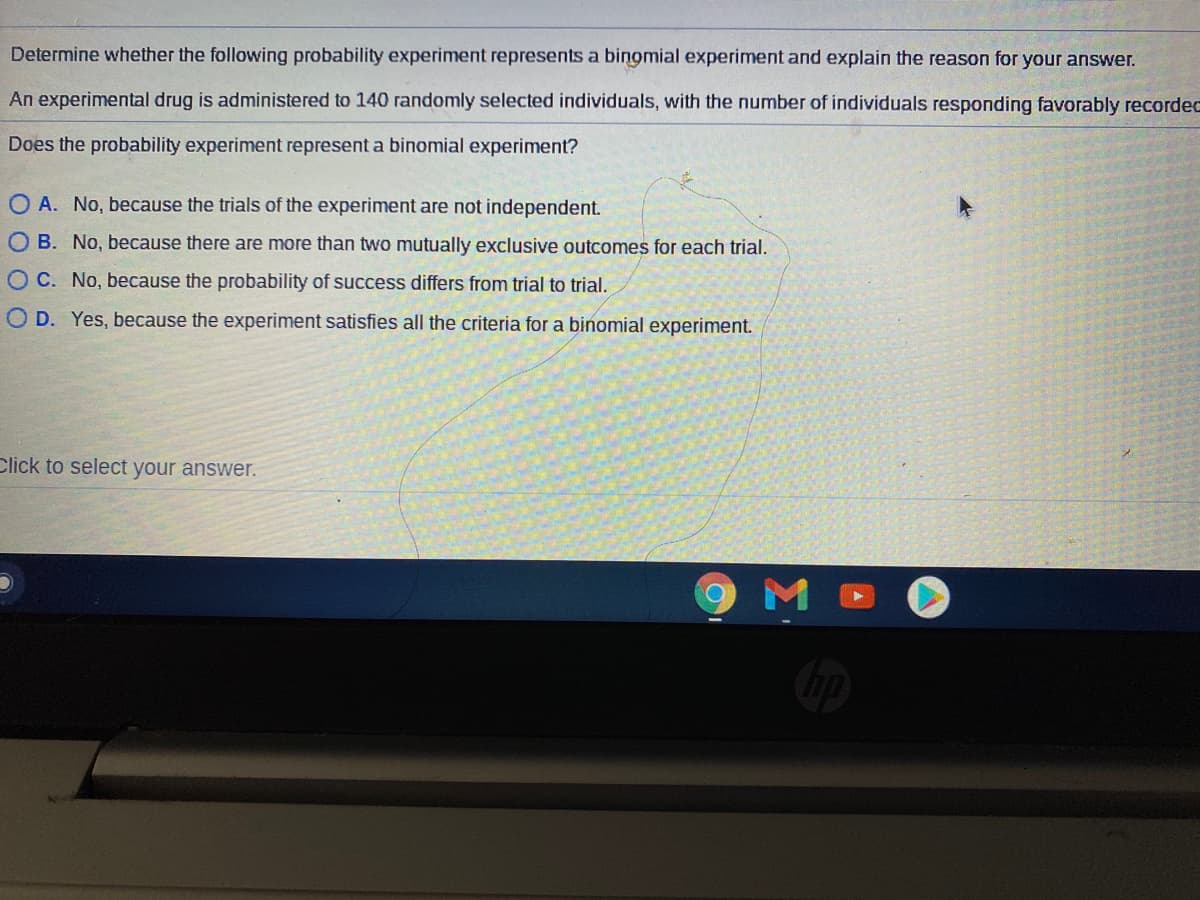Determine whether the following probability experiment represents a bingmial experiment and explain the reason for your answer. An experimental drug is administered to 140 randomly selected individuals, with the number of individuals responding favorably recorde- Does the probability experiment represent a binomial experiment? O A. No, because the trials of the experiment are not independent. O B. No, because there are more than two mutually exclusive outcomes for each trial. O C. No, because the probability of success differs from trial to trial. O D. Yes, because the experiment satisfies all the criteria for a binomial experiment.
Determine whether the following probability experiment represents a bingmial experiment and explain the reason for your answer. An experimental drug is administered to 140 randomly selected individuals, with the number of individuals responding favorably recorde- Does the probability experiment represent a binomial experiment? O A. No, because the trials of the experiment are not independent. O B. No, because there are more than two mutually exclusive outcomes for each trial. O C. No, because the probability of success differs from trial to trial. O D. Yes, because the experiment satisfies all the criteria for a binomial experiment.
College Algebra
7th Edition
ISBN:9781305115545
Author:James Stewart, Lothar Redlin, Saleem Watson
Publisher:James Stewart, Lothar Redlin, Saleem Watson
Chapter9: Counting And Probability
Section9.3: Binomial Probability
Problem 2E: If a binomial experiment has probability p success, then the probability of failure is...
Related questions
Concept explainers
Contingency Table
A contingency table can be defined as the visual representation of the relationship between two or more categorical variables that can be evaluated and registered. It is a categorical version of the scatterplot, which is used to investigate the linear relationship between two variables. A contingency table is indeed a type of frequency distribution table that displays two variables at the same time.
Binomial Distribution
Binomial is an algebraic expression of the sum or the difference of two terms. Before knowing about binomial distribution, we must know about the binomial theorem.
Topic Video
Question

Transcribed Image Text:Determine whether the following probability experiment represents a bingmial experiment and explain the reason for your answer.
An experimental drug is administered to 140 randomly selected individuals, with the number of individuals responding favorably recordec
Does the probability experiment represent a binomial experiment?
O A. No, because the trials of the experiment are not independent.
O B. No, because there are more than two mutually exclusive outcomes for each trial.
OC. No, because the probability of success differs from trial to trial.
O D. Yes, because the experiment satisfies all the criteria for a binomial experiment.
Click to select your answer.
9MD
Expert Solution
This question has been solved!
Explore an expertly crafted, step-by-step solution for a thorough understanding of key concepts.
This is a popular solution!
Trending now
This is a popular solution!
Step by step
Solved in 2 steps with 1 images

Knowledge Booster
Learn more about
Need a deep-dive on the concept behind this application? Look no further. Learn more about this topic, statistics and related others by exploring similar questions and additional content below.Recommended textbooks for you

College Algebra
Algebra
ISBN:
9781305115545
Author:
James Stewart, Lothar Redlin, Saleem Watson
Publisher:
Cengage Learning


College Algebra
Algebra
ISBN:
9781305115545
Author:
James Stewart, Lothar Redlin, Saleem Watson
Publisher:
Cengage Learning
